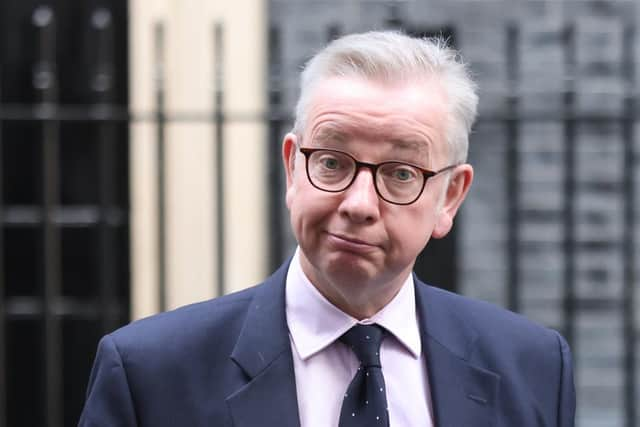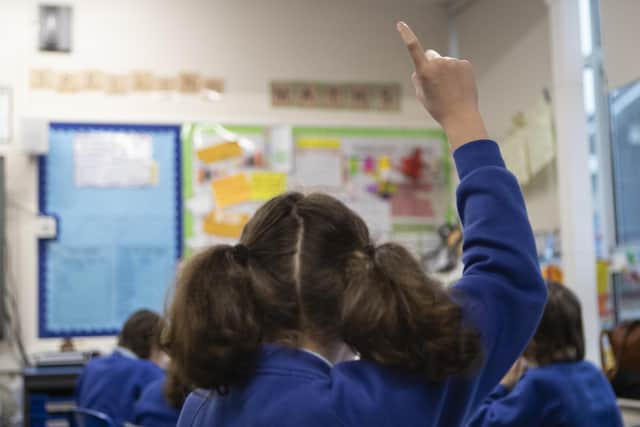Key levelling up targets 'highly unlikely' to be hit by 2030, Michael Gove warned
The Levelling Up Secretary has based his plan to reduce regional inequality around 12 national “missions” covering areas including economy, housing, education, transport and culture with targets for dramatic improvements by 2030.
More mayors are to be created under a new framework for devolution deals, with extra powers handed to existing ones - while the system for council bidding for Government funds is to be simplified.
Advertisement
Hide AdAdvertisement
Hide AdLevelling Up Directors are to be appointed and based in regions across the UK to help co-ordinate efforts at a local and national level.


The Levelling Up White Paper promises that responsibility for spending the UK Shared Prosperity Fund - which is the post-Brexit replacement to EU structural funding - will fall to local leaders.
Mr Gove’s plan said it was a “21st Century recipe for a new Industrial Revolution”.
Funding for schemes announced in the plan comes from allocations previously set out in the spending review, rather than new pots of cash.
Advertisement
Hide AdAdvertisement
Hide AdMr Gove said boosting business activity in poorer areas towards the national average would dramatically improve the UK’s economy by “tens of billions of pounds each year”.


The plan describes itself as a “critical stepping stone” in the Government’s ambition of “ensuring that geography is no longer destiny”.
Shadow levelling up secretary Lisa Nandy said the plan amounted to “ministers scurrying around Whitehall shuffling the deckchairs, cobbling together a shopping list of recycled policies and fiddling the figures”.
But the White Paper’s overarching ambitions were given a cautious welcome by Yorkshire’s Labour mayors Dan Jarvis and Tracy Brabin - although both said more funding would be required to deliver on what it has promised.
Advertisement
Hide AdAdvertisement
Hide AdThe targets for 2030 include making public transport connectivity “significantly closer” to the standards of London, having a “globally-competitive city” in every area of the UK and cutting the gap in healthy life expectancy between the poorest and richest areas.
The Government also aim to have 90 per cent of children leaving primary school meeting expectations in reading, writing and maths - up from 65 per cent in 2019.
Institute for Fiscal Studies director Paul Johnson said while the White Paper laudably recognised the scale of the challenge there were major doubts on whether its medium-term ambitions were deliverable.
He said: “The targets are largely in the right areas, but many look extremely ambitious - that is to say highly unlikely to be met, even with the best policies and much resource. There is little detail on how most of them will be met, and less detail on available funding. There is something for everyone, and hence little sense of prioritisation: ambition and resource will be spread very thin.”
Advertisement
Hide AdAdvertisement
Hide AdHe added: “Meeting the core ambition of simultaneously improving education and skill levels and availability of high paying jobs in poorer regions will prove extremely challenging.
“Without that, levelling up will not happen.
“It will require the level of focus that has gone into this White Paper being developed and maintained over decades.”
Levelling Up Minister Neil O’Brien, who is originally from Huddersfield, told The Yorkshire Post the plan represented “the biggest ever transfer of power from Westminster in modern times”.
He said: “The publication of the Levelling Up White Paper is our masterplan for putting right the geographical inequalities that exist and radically improving the UK. By levelling up, we will make life in Yorkshire better, and in doing so, grow the economy and ensure we flourish as a country.”
Funding shift 'will create top jobs in Yorkshire'
Advertisement
Hide AdAdvertisement
Hide AdHighly-paid jobs can be created in Yorkshire by plans to increase research and development spending outside the ‘Golden Triangle’, Neil O’Brien has said.
“Government Research and Development spending has become more concentrated over time in Oxford, Cambridge and London. The White Paper sets out how we will change that: we will grow R&D spending by a third outside the greater south east over the next three years alone - so that we can use it to grow new industries and more high tech, high pay jobs in Yorkshire.”
By 2030, the spending should have increased by 40 per cent.
Read more:
Support The Yorkshire Post and become a subscriber today. Your subscription will help us to continue to bring quality news to the people of Yorkshire. In return, you'll see fewer ads on site, get free access to our app and receive exclusive members-only offers. Click here to subscribe.